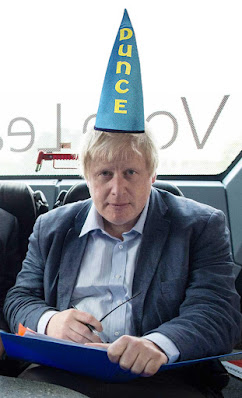 |
| Who's the fattest of them all? Everyone else's well-being may be victims of their brainless girth. |
[WARNING: In the spirit of Trump's disdain for political correctness, I am waiving it for this post, although the subjects here fully deserve the opprobrium they receive.] I do not need any encouragement to poke fun at American obesity since I've always considered it as part of US descent into, ah, fatheadedness. Prominent examples of US decline are its recent political class: Chicken Barr, Portly Pomepo and Plump Trump. These lard-assed eater-leaders exemplify current Americanness to the rest of the world--fat and obnoxiously loud despite having nothing good to say (or do). While busy wrecking the United States--and the rest of the world by sheer dint of America's influence and reach--the question is posed: How can the planet be saved from more malevolent Yankee lardasses?
This post was inspired by a Quora question asking who is the most obese among these biggies. I'm not entirely certain, but I'd say (1) Barr, (2) Pompeo, (3) Trump in terms of body mass index. No matter; all are comfortably obese. The more important question is the relation between obesity and stupidity as the title states: Trump and Pompeo have teamed up to destroy America's reputation abroad. Barr has done the same to the Department of Justice but lost Trump's favor anyway. That's some reward for longtime sycophancy.
Now, the evidence is not clear on whether low IQ leads to being fat or the other way around. Is it that fatsos like these cannot comprehend what it takes to maintain one's health, or that being fat has deleterious effects on cognitive functioning? That chicken-and-egg question remains unresolved. (In terms of sheer idiocy, Trump's idea that minimal exertion is the key to health literally takes the cake[s].) Still, one can probably make the intermediate argument that low IQ is an obesity risk based on existing research on the subject matter:
Although the present findings provide valuable information on the link between low IQ and obesity, it is important to understand that IQ is a nonmodifiable risk factor that is rarely assessed in the general population. Therefore, the development of obesity prevention programs focusing on intelligence is difficult to implement. Nevertheless, IQ may be regularly assessed in specific situations such as the follow‐up of children with developmental difficulties or the follow‐up of adults with psychiatric disorders. Our findings suggest that low IQ is an independent risk factor for obesity even after adjusting for several potential confounding factors. Thus, we believe that individuals with low cognitive abilities should be screened for obesity on a regular basis. Furthermore, the management of individuals with low IQ should be transdisciplinary, and should involve several health professionals (eg, dietitian, physiotherapist, and general practitioner) in order to evaluate their health behaviors (eg, diet and physical activity) that may lead to obesity.
They say that people choose the leaders they deserve. In the US case, you can at least vouch for its leaders exemplifying the, ah, width and breadth of its population. Physique-wise, and I would argue intellect-wise, these three are representative democracy weighing in fully on leadership attributes.
Stopping Americans from electing obese people--who then put even more of their kind in leadership positions--is probably an overlooked way to avoid further American damage to the rest of the world. Given current trends, though, non-obese people are becoming an endangered species Stateside, so too bad for us all.















